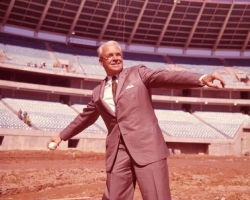Ivan Allen Jr. Biography: Atlanta Growth

Allen not only stood out in his handling of race relations, which helped Atlanta grow faster than cities such as Birmingham, but due to the changed racial climate, he was able to attract major league sports to a southern city. In 1965, the Falcons started their franchise in Atlanta as an NFL expansion team. In 1966, Allen brought the Braves to Atlanta from Milwaukee and built a new, stadium for them. The year 1968 saw the Hawks basketball team arrive. Allen had managed to make his city a sports center, part of a long-time effort to enhance the city’s appeal. He was always, like his father, the city booster. Atlanta was now described as a booming Sun Belt city rather than a bastion of Old South segregation as other southern cities were called.
Allen succeeded in accomplishing part of a six-point program he had first stated as Chamber of Commerce president in 1961. His plans called for school desegregation, highway construction, an urban renewal strategy, mass transit, a city auditorium and coliseum, and a Forward Atlanta program as a public relations campaign to appeal to businesses and tourists.
The schools had been desegregated officially and through court orders. but due to white flight and the resistance of school superintendent John Letson in the 1960s, the schools quickly resegregated. Highway construction had begun in the 1950s, and although Atlanta built important expressways for downtown, these roads and urban renewal also had the effect of destroying black neighborhoods and making it easier for whites to leave the city. Mass transit was being planned and a line would open in the 1970s. However, planning in the 1960s neglected black areas and failed to include much black involvement in discussions on the placement of the transit lines, and thus generated opposition. The auditorium (civic center) and coliseum (stadium) were built in the Allen years, but this too destroyed black housing and neighborhoods. Forward Atlanta worked well since the city had emerged as a southern leader in race relations and moderation. Allen was a businessman who saw the importance of rebuilding the city, especially downtown, and worked with that in mind, while also reaching out to black leaders, but he had to be reminded at times, often by a politically energized black leadership, to do that outreach. Some of these issues, such as effective school desegregation, were beyond what a mayor could correct and reflected the powerful white business community’s view. But Hartsfield and especially Allen began bringing their African American fellow citizens into the discussion of how the city should develop.
Collection items featured on this page and other items of interest:
